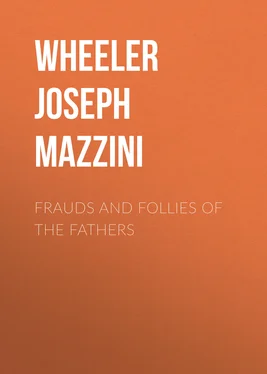Joseph Wheeler - Frauds and Follies of the Fathers
Здесь есть возможность читать онлайн «Joseph Wheeler - Frauds and Follies of the Fathers» — ознакомительный отрывок электронной книги совершенно бесплатно, а после прочтения отрывка купить полную версию. В некоторых случаях можно слушать аудио, скачать через торрент в формате fb2 и присутствует краткое содержание. Жанр: foreign_prose, foreign_religion, Философия, foreign_psychology, foreign_antique, на английском языке. Описание произведения, (предисловие) а так же отзывы посетителей доступны на портале библиотеки ЛибКат.
- Название:Frauds and Follies of the Fathers
- Автор:
- Жанр:
- Год:неизвестен
- ISBN:нет данных
- Рейтинг книги:5 / 5. Голосов: 1
-
Избранное:Добавить в избранное
- Отзывы:
-
Ваша оценка:
- 100
- 1
- 2
- 3
- 4
- 5
Frauds and Follies of the Fathers: краткое содержание, описание и аннотация
Предлагаем к чтению аннотацию, описание, краткое содержание или предисловие (зависит от того, что написал сам автор книги «Frauds and Follies of the Fathers»). Если вы не нашли необходимую информацию о книге — напишите в комментариях, мы постараемся отыскать её.
Frauds and Follies of the Fathers — читать онлайн ознакомительный отрывок
Ниже представлен текст книги, разбитый по страницам. Система сохранения места последней прочитанной страницы, позволяет с удобством читать онлайн бесплатно книгу «Frauds and Follies of the Fathers», без необходимости каждый раз заново искать на чём Вы остановились. Поставьте закладку, и сможете в любой момент перейти на страницу, на которой закончили чтение.
Интервал:
Закладка:
J. M. Wheeler
Frauds and Follies of the Fathers. A Review of the Worth of Their Testimony to the Four Gospels
I
To expose the delirium and delinquencies of a respected or even respectable body of men is always an ungracious, though it may not be an unnecessary, task. But when we are informed that rejection of certain supernatural stories means our condemnation here and damnation hereafter, we feel tempted to examine the kind of men who first accepted and promulgated those stories. The man who tells me I shall be damned if I do not believe in his theories or thaumaturgy may have many estimable qualities, but he must not be surprised if, disregarding these, I call attention to instances of his credulity. When, moreover, priests assume authority over conduct on the ground that their Church or their doctrines were God-given, it becomes necessary to investigate how that Church and those doctrines were built up; and if we find superstitious fooleries and pious frauds mixed therein, it may do something to abate our confidence in priestly pretentions.
In regard to the Fathers, as to much else, the Catholic is the most consistent of all Christian Churches. The men who established the Church, and fixed what was and what was not Canonical Gospel, are surely entitled to some authority on the part of believers. When Protestants wish to prove the authenticity of their infallible book, they have to fall back upon the witness of the fallible Fathers whose authority they are at other times always ready to repudiate.
The intellectual and moral character of the men who were the original depositaries of Christian faith and literature is then evidently of the utmost importance. All historical evidence as to the authenticity of the New Testament, or the faithfulness of ecclesiastical history, comes through them. If they were credulous and untrustworthy, the edifice built upon their testimony or their faith will be found to be tottering.
Now, concerning the Fathers of the Christian Church, we have, at the outset, to allege that, as a class, not only were they superstitious and credulous, and therefore unreliable, but that many of them were absolutely fraudulent, not hesitating to use any and every means to further the interests of their religion.
Bishop C. J. Ellicott, in his article on the Apocryphal Gospels, which appeared in the "Cambridge Essays" for 1856, pp. 175, 176, says: "But credulity is not the only charge which these early ages have to sustain. They certainly cannot be pronounced free from the influence of pious frauds.... It was an age of literary frauds. Deceit, if it had a good intention, frequently passed unchallenged.... However unwilling we may be to admit it, history forces upon us the recognition of pious fraud as a principle which was by no means inoperative in the earliest ages of Christianity."
Jeremiah Jones says: "To make testimonies out of forgeries and spurious books to prove the very foundation of the Christian revelation, was a method much practised by some of the Fathers, especially Justin Martyr, Clemens Alexandrinus, and Lactantius."—"A New and Full Method of Settling the Canonical Authority of the New Testament," part ii., chap, xxxiv., p. 318, vol. i. 1827.
B. H. Cowper, a well-known champion of Christianity, and once editor of the Journal of Sacred Literature , confesses in the Introduction to his "Apocryphal Gospels" (p. xxv., 1867): "Ancient invention and industry went even further, and produced sundry scraps about Herod, Veronica, Lentuius, and Abgar, wrote epistles for Christ and his mother, and I know not how much besides. No difficulty stood in the way; ancient documents could easily be appealed to without necessarily existing; spirits could be summoned from the other world by a stroke of the pen, and be made to say anything; sacred names could be written and made a passport to fictions, and so on ad libitum ."
M. Daillé says: "For these forgeries are not new and of yesterday; but the abuse hath been on foot above fourteen hundred years."—"The Right Use of the Fathers," p. 12, 1675. Mosheim mentions a variety of commentaries filled with impostores or fables on our Savior's life and sentiments, "composed soon after his ascent into heaven, by men who, without being bad, perhaps, were superstitious, simple, and piously deceitful. To these were afterwards added other writings falsely accredited to the most holy apostles by fraudulent individuals."—"Institutes of Ecclesiastical History," part iii, chap. ii, sec. 17, p. 65, vol. i. Stubbs's edition, 1863.
The same justly-renowned historian declares that "a pernicious maxim which was current in the schools, not only of the Egyptians, the Platonists, and the Pythagoreans, but also of the Jews, was very early recognised by the Christians, and soon found among them numerous patrons—namely, that those who made it their business to deceive with a view of promoting the cause of truth were deserving rather of commendation than censure."—"Commentaries on the Affairs of the Christians before the time of Constantino the Great." Second century. sec. 7, pp. 44, 45. R. S. Vidat's translation. 1813.
Dr. Gieseler, Professor of Theology in Gottingen, says: "In reference to the advancement of various Christian interests, and in like manner also to the confirmation of those developments of doctrine already mentioned, the spurious literature which had arisen and continually increased among the Jews and Christians, was of great importance. The Christians made use of such expressions and writings as had already been falsely attributed by Jews, from partiality to their religion, to honored persons of antiquity, and altered them in parts to suit their own wants, such as the book of Enoch and the fourth book of Ezra. But writings of this kind were also fabricated anew by Christians, who quieted their conscience respecting the forgery with the idea of their good intention, for the purpose of giving greater impressiveness to their doctrines and admonitions by the reputation of respectable names, of animating their suffering brethren to steadfastness, and of gaming over their opponents to Christianity."—"Compendium of Ecclesiastical History," sec. 52, vol. i., pp. 157, 158. Translated by Dr. S. Davidson. T. & T. Clark's Foreign Theological Library.
But as our purpose is to examine these writings somewhat in detail, we will commence with
This name is given to those Christian writers who are alleged to have had intercourse with the Apostles. These writings are said to date from about 97 to 150 a.c. Dr. J. Donaldson says: "Of these writers investigation assures us only of the names of three, Clement, Polycarp and Papias. There is no satisfactory ground for attributing the 'Epistle of Barnabas' to Barnabas, the friend of Paul, nor the 'Pastor' of Hermas to the Hermas mentioned in the Epistle to the Romans." 1 1 "The Apostolical Fathers," chap, i., p. 101, 1874.
Yet it is to be noticed that both these works were read in the primitive churches as Scripture, and are included in the Sinaitic Codex, which is asserted to be the most ancient manuscript of the New Testament extant.
We take first
There is a "fellow-laborer" with Paul of the name of Clement, mentioned in his Epistle to the Philippians (iv., 3), but whether this is the same individual whom the Catholics make a Pope of Rome, and some of the Fathers say was a kinsman of the Roman Emperor, is a matter of dispute, and much doubted by the best authorities. Bishop Lightfoot ("St. Paul's Epistles: Philippians," p. 166) says: "The notices of time and place are opposed to the identification of the two." A sufficient evidence of the estimation in which St. Clement was held, however, is to be found in the number of forgeries which Christian piety have palmed upon the world in his name. In the Alexandrian Codex, one of the oldest and most important manuscripts of the New Testament, two epistles addressed to the Corinthians stand inscribed with his name, and are enumerated in the list of books of the New Testament. Of these, the second is on all hands allowed to be a forgery, and the first is generally considered to be interpolated. That forgeries or interpolations have taken place in regard to those books of the same Codex which, upon the authority of certain Fathers, have been formed into the received canon of sacred Scripture, must not, of course, be suspected on pain of everlasting burning. The fact of the Epistle to the Hebrews being ascribed to St Paul, the second Epistle ascribed to St Peter, and such texts as those of the heavenly witnesses (1 John v., 7, 8), show any scholar that nothing of the kind could have taken place by any possibility whatever. Is it likely that God would allow his Holy Word to be tampered with?
Читать дальшеИнтервал:
Закладка:
Похожие книги на «Frauds and Follies of the Fathers»
Представляем Вашему вниманию похожие книги на «Frauds and Follies of the Fathers» списком для выбора. Мы отобрали схожую по названию и смыслу литературу в надежде предоставить читателям больше вариантов отыскать новые, интересные, ещё непрочитанные произведения.
Обсуждение, отзывы о книге «Frauds and Follies of the Fathers» и просто собственные мнения читателей. Оставьте ваши комментарии, напишите, что Вы думаете о произведении, его смысле или главных героях. Укажите что конкретно понравилось, а что нет, и почему Вы так считаете.











